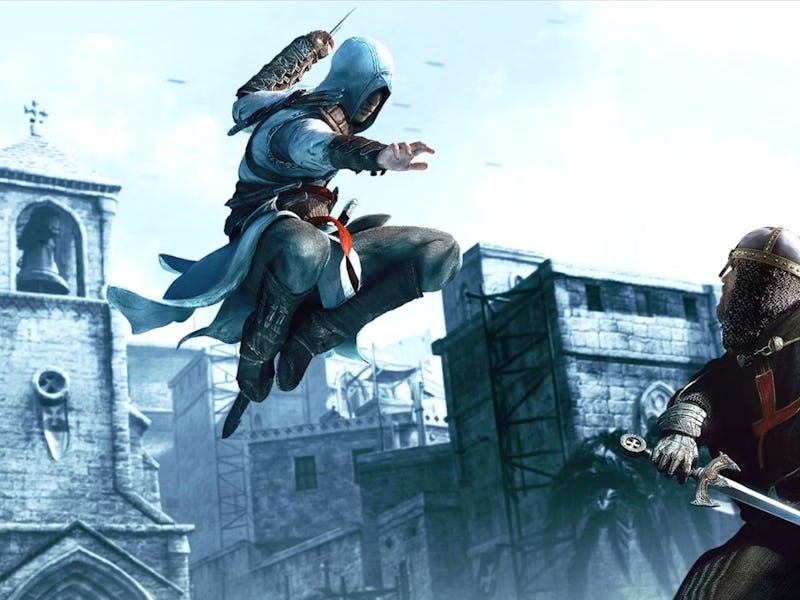
With Assassin’s Creed Shadows, the series is finally heading to the number one historical setting requested by fans, Feudal Japan. It’s a time period absurdly rich in possibilities, with countless tales of heroism, intrigue, and bloodthirsty conflict. What’s interesting, however, is the game’s dual protagonists, including the first playable character based on a real-life person in Assassin’s Creed. Featuring the African samurai Yasuke as a main hero has led to some discussion online about the series’ historical accuracy, but it’s a key moment to point out that “accuracy” has never been a concern for Assassin’s Creed. History has always been a tool the series has utilized to create a virtual playground, a fantasy story based on reality.
Over the years, Assassin’s Creed has started to lean more heavily into its fantastic elements, and that’s been abundantly clear with the most recent entries. In Origins you battle the Egyptian god Anubis, in Odyssey you come face-to-face with a Minotaur, and Valhalla has an entire subplot about the Norse gods who were precursors to humans.
While these games have embraced full-on fantastical absurdity, even from the first game all the way back in 2007, history has been nothing but a building block for the franchise, just another feature.
The entire premise of Assassin’s Creed, since the beginning has been high-level science fiction, given legitimacy by looping in real history.
In the first Assassin’s Creed, you play as Altair, a young member of the ultra-secretive Brotherhood during the time of the Third Crusades. The original game uses a number of real-life historical figures and organizations, but even the interpretation of both isn’t exactly accurate.
The most obvious example here is the whole Templar versus Assassins conflict, a core aspect of the game that’s completely fabricated. There were Assassin organizations and the Templars did take part in the Third Crusades, but there’s never been anything remotely said about any kind of conflict between the two. Then there are plenty of character assassinations that have dates completely different to when they actually happened. Perhaps the most obvious, however, is the fact that no assassin in history would have worn bright white, highly recognizable, robes. That just seems unwise.
That idea right there is central to what Assassin’s Creed has always strived to do: make history cool. Future games would make historical figures central pieces of the plot, but weave in completely original personalities for said characters that can integrate them directly into the game’s narrative.
Leonardo da Vinci invents ranged weapons and a paraglider for Ezio, master assassin Jacob Frye helps Karl Marx start a working-class uprising, and Pythagoras entrusts a magic staff that grants immortality to Cassandra.
Assassin’s Creed is essentially a giant toy box for history buffs, using what we know about real events to flesh out a bizarre sci-fi epic. The series has always excelled in finding events or people that don’t have a lot of recorded history, relying on intrigue and mystery to aid its storytelling. It’s like taking the action figures you bought at the museum and mixing them with your Dragon Ball Z toys.
Making Yasuke a protagonist gives players a link to arguably the most influential person of the time period, while still allowing a ton of room for embellishment.
That’s exactly what makes Yasuke as a main character so fascinating, especially when paired with a second protagonist who can dive into other aspects of Japanese history and culture. Yasuke has a fascinating tale, historians believe he was born in what is now modern-day Mozambique, but in 1581 he traveled to Kyoto, although it’s unknown exactly how he got there. In Kyoto he met one of the most famous figures in Japanese history, the daimyo Oda Nobunaga.
Any game set in Feudal Japan almost has to feature Oda in some way, but casting you as one of his retainers, whose past is shrouded in mystery, is brilliant. Yasuke is a character that immediately stands out in the time period, but there’s a lot of narrative complexity that can be explored in his history, station, and relationship with powerful figures. That’s Assassin’s Creed to a tee, and making a secondary protagonist, who is fictional, could allow the game to explore some fascinating avenues of fact versus fiction, especially in a time period where tales of heroism are so embellished.
In fact, casting Yasuke as a main character feels like the most “faithful” way Shadows is sticking to the series’ vision. It’s all about that toybox idea. His story is fascinating, almost romantic in a way. Casting Yasuke as the main character lets Assassin’s Creed do exactly what it’s been doing for 17 years: find intentionally mysterious pieces of history ripe for expansion and embellishment. If you’re someone who’s hoping for historical accuracy from Assassin’s Creed, I don’t know what series you’ve been playing for 17 years.